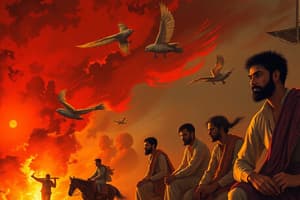Podcast
Questions and Answers
Which of these authors is known for the collection 'Malgudi Days'?
Which of these authors is known for the collection 'Malgudi Days'?
- Ruskin Bond
- RK Narayan (correct)
- Rabindranath Tagore
- Jhumpa Lahiri
Name one major theme addressed by Indian authors in their short stories during the colonial era.
Name one major theme addressed by Indian authors in their short stories during the colonial era.
Resistance against colonialism
Post-independence Indian short stories have become less relevant in contemporary literature.
Post-independence Indian short stories have become less relevant in contemporary literature.
False (B)
The author Rabindranath Tagore is known for his collection titled __________.
The author Rabindranath Tagore is known for his collection titled __________.
Which of the following writers is NOT mentioned as contributing to Indian short fiction?
Which of the following writers is NOT mentioned as contributing to Indian short fiction?
Match the following authors with their works:
Match the following authors with their works:
Indian short stories during the colonial period portrayed Indian figures as heroes fighting oppressive colonial authority.
Indian short stories during the colonial period portrayed Indian figures as heroes fighting oppressive colonial authority.
List two characteristics of Indian short stories post-independence.
List two characteristics of Indian short stories post-independence.
What impact did Thomas Macaulay’s minute decree have on Indian literature?
What impact did Thomas Macaulay’s minute decree have on Indian literature?
The introduction of English education in India increased interest in native language literature.
The introduction of English education in India increased interest in native language literature.
The aim of early Indian novels in English was often to solve mysteries surrounding _______.
The aim of early Indian novels in English was often to solve mysteries surrounding _______.
Match the following cities with their significance in the early Indian novel in English:
Match the following cities with their significance in the early Indian novel in English:
When is it believed that the Indian novel in English began to emerge?
When is it believed that the Indian novel in English began to emerge?
Which of the following best describes the primary audience for early Indian authors writing in English?
Which of the following best describes the primary audience for early Indian authors writing in English?
The diversity in early Indian novels in English suggests a continuous literary tradition.
The diversity in early Indian novels in English suggests a continuous literary tradition.
What literary devices did Indian authors start blending with traditional themes?
What literary devices did Indian authors start blending with traditional themes?
Kiran Desai won the Padma Vibhushan for her literary contributions.
Kiran Desai won the Padma Vibhushan for her literary contributions.
Who among the following authors is known for the novel 'Godaan'?
Who among the following authors is known for the novel 'Godaan'?
Name the three prominent post-independence writers known as the Trio or Trinity.
Name the three prominent post-independence writers known as the Trio or Trinity.
Bhavani Bhattacharya was the first post-independence major novelist who won the __________ Academy Award.
Bhavani Bhattacharya was the first post-independence major novelist who won the __________ Academy Award.
Match the authors to their notable works:
Match the authors to their notable works:
What is a primary theme explored in 'The Inheritance of Loss'?
What is a primary theme explored in 'The Inheritance of Loss'?
Raj Mulak Anand is known for his compassion for the downtrodden masses.
Raj Mulak Anand is known for his compassion for the downtrodden masses.
Manohar Malgaonkar wrote about a male-dominated world where women were considered mere __________ of pleasure.
Manohar Malgaonkar wrote about a male-dominated world where women were considered mere __________ of pleasure.
Flashcards are hidden until you start studying
Study Notes
Key Authors and Works
- Khushwant Singh received the Padma Vibhushan in 2007, recognized for "Train to Pakistan," which explores the horrors of India’s partition.
- Kiran Desai's "The Inheritance of Loss" addresses globalization, migration, and identity loss, set in the Himalayas, and won the Man Booker Prize as well as the National Book Critics Circle Fiction Award.
- Premchand is a significant Hindi-Urdu writer whose classic novel "Godaan" portrays socio-economic struggles of rural India through the lens of a poor farmer.
Evolution of Indian Literature in English
- The emergence of Indian novels in English began in the 19th century, with Rabindranath Tagore and Munshi Premchand at the forefront.
- Raj Mulak Anand, Raja Rao, and RK Narayan, known as the "Trinity," are pivotal post-independence writers, prominently addressing social issues.
- Anand is noted for "Untouchables," highlighting the plight of marginalized groups in Indian society.
Post-Independence Literature
- Bhavani Bhattacharya (1906-1988) was the first prominent post-independence novelist, awarded the Sahitya Akademi Award; notable works include "Goddess Named Gold" and "Shadow from Ladakh."
- Manohar Malgaonkar's writing critiques male dominance and the objectification of women in society.
Impact of English Education on Indian Literature
- Thomas Macaulay’s decree established English as the medium of higher education, shifting literary interests towards English novels among educated Indians.
- The proliferation of English novels facilitated a blend of contemporary themes with traditional Indian narratives, enriching the literary landscape.
Short Stories in Indian Literature
- The short story genre gained prominence post-independence, with authors like Ruskin Bond and Jhumpa Lahiri contributing to its evolution.
- Tagore and Narayan's collections, such as "Malgudi Days" and "Gitanjali," exemplify significant works in Indian short fiction.
- During the colonial era, short stories served as tools of resistance, offering critiques of British narratives and reclaiming Indian identity.
Colonial Resistance through Literature
- Indian short stories often used heroic figures to challenge colonial oppression, promoting self-identity and cultural heritage.
- Authors like Rabindranath Tagore and RK Narayan confronted colonialism through their narratives, highlighting India's cultural richness and questioning colonial perceptions of primitiveness.
- The literary responses to social injustices illustrate the complexities of India's freedom movement and the treatment of marginalized communities.
Studying That Suits You
Use AI to generate personalized quizzes and flashcards to suit your learning preferences.




